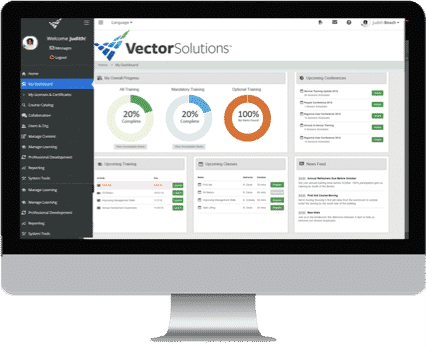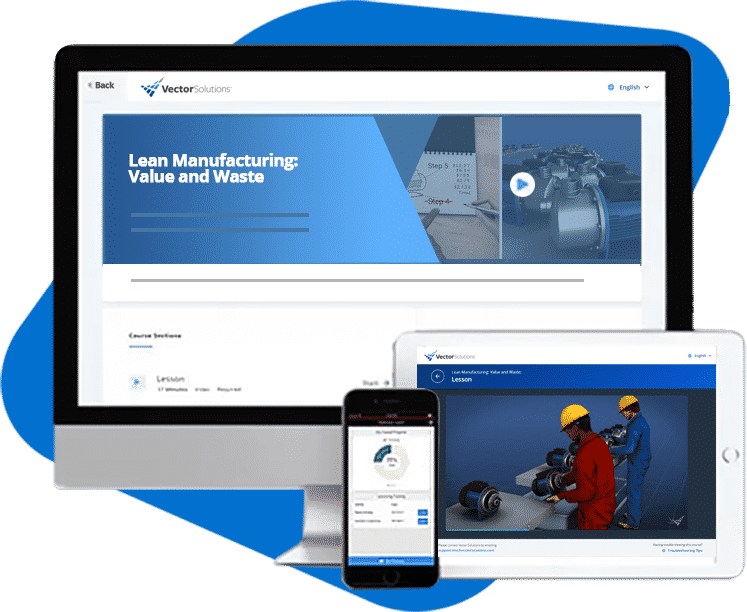April 26, 2024 8 min read

Manufacturing Certifications for Enhancing Your Organization’s Safety, Quality, and Leadership
Industry:
Solution:

In the manufacturing sector, earning certifications can be foundational to success and demands a continuous commitment across all levels of the organization. Manufacturing certifications are more than ticking a compliance checkbox; they represent a dedication to operational excellence and compliance with the highest of industry standards. Encouraging employees to obtain these certifications boosts operational efficiency, safety, and compliance and enhances job satisfaction and employee empowerment, essential for fostering a supportive workplace atmosphere.
What are Manufacturing Certifications?
Manufacturing certifications are qualifications issued by professional bodies to confirm the skills and abilities of manufacturing professionals. These voluntary credentials are usually awarded after passing exams or performance evaluations. They serve as a benchmark for industry standards, ensuring that certified individuals possess the necessary expertise to meet the demands of the manufacturing industry.

What are the 3 Types of Certifications?
There are three primary categories of certifications, each defined by its scope of application and level of specificity. These categories are:
- Corporate (internal). These are certifications that are designed within a company for its specific needs. For instance, a manufacturing firm might mandate a specialized training session for its operational staff, culminating in a certification that verifies the completion of this training.
- Product-specific. These certifications are crafted to be applicable to specific products regardless of where they are used. This type of certification is particularly common in industries where precision and specific technical knowledge about tools or products are crucial. In manufacturing, technicians might receive certification in handling a specific type of machinery, like a forklift, which is recognized across various manufacturing plants that utilize the same equipment. These certifications are valuable for ensuring standardized knowledge and practices.
- Profession-wide. These certifications are developed by professional organizations to uphold standards, enhance the practice level, and safeguard the public. In manufacturing, examples include the International Association for Six Sigma Certification (IASSC) or American Society for Quality (ASQ). These certifications are designed to be portable and applicable wherever the individual might choose to work, thereby enhancing both credibility significantly.
Easy License Renewal with Vector LMS
Streamline the continuing education process for your workforce, from engineers to project managers. Our platform offers easy access to accredited courses, simplifies management of multiple certifications, and tracks renewal dates across 100+ accrediting bodies.
Learn How
The 6 Benefits of Manufacturing Certifications
Manufacturing certifications not only drive business competitiveness but also enhance workforce engagement.
1. Building a Competitive Business
In the fiercely competitive global manufacturing market, firms must uphold superior operational practices to produce high-quality products. Without this commitment, businesses risk producing inferior products, potentially driving customers—and workers—to competitors.
By encouraging your workforce to earn and continuously renew their certifications, you highlight your commitment to high production standards, quality, and efficient processes. This enhances your company’s appeal to potential clients who prioritize quality and reliability and makes you more attractive to top talent.
2. Cultivating a Committed Workforce
Certifications extend beyond just boosting technical skills; they also cultivate a sense of achievement and validate the professional capabilities of employees, significantly enhancing their job satisfaction. A workforce that holds relevant certifications is typically more engaged and motivated, leading to reduced turnover rates and elevated productivity.
When employees are engaged, turnover rates are 43% lower than at companies with low engagement. And when employees observe that their company is investing in their professional growth, it fosters greater loyalty and can better align their ambitions with the strategic goals of the organization.
3. Future-Proofing Your Business
As technology and methodologies continue to evolve while new challenges arise in the manufacturing landscape, the importance of keeping certifications up to date cannot be overstated. Continuous learning and adaptation are critical for manufacturers to stay competitive and compliant with evolving industry standards.
4. Keeping Pace with Technological Advancements
Manufacturing is increasingly being shaped by technological advancements such as automation, robotics, and artificial intelligence. Employees who are trained in the latest trends are better equipped to integrate these technologies into their workflows, enhancing productivity and innovation.
5. Addressing the Skills Gap
The manufacturing industry is facing a skills gap, where the demand for skilled labor outstrips supply. Regularly earning and renewing certifications provides a pathway for employees to acquire the necessary skills to meet current and future demands.
6. Supporting Licensed Professionals
Certifications are also vital for licensed professionals, such as engineers, who need to fulfill continuing education requirements to maintain their licenses and stay in touch with industry changes. This aspect of certification helps ensure that professionals not only meet compliance requirements but also continue their professional development, which is crucial for career advancement and maintaining high standards of practice within the industry.
Important Manufacturing Certifications
Staying competitive involves not just keeping up but leading the way. Pursuing manufacturing certifications is key to remaining innovative. The certifications detailed below cover several essential areas, highlighting their importance in developing a skilled, safe, and efficient manufacturing workforce.
- Quality and Process Improvement Certifications: These certifications are geared towards professionals looking to enhance their skills in quality control and process efficiency. Examples include Six Sigma and 5S.
- HSE Certifications: These certifications are crucial for organizations that aim to minimize their environmental impact, ensure the safety and quality of food and health products, and adhere to health and environmental regulations. Examples include Certified Safety Professional (CSP) and HAZWOPER.
- Machinery and Operational Certifications: Focused on the practical and technical skills required to operate specific machinery and tools, these certifications are crucial for workers involved in the daily operational aspects of manufacturing. Examples include OSHA Forklift Operator and Certified Manufacturing Engineer (CMfgE).
- Leadership and Development Certifications: These certifications are designed to develop the managerial and supervisory skills necessary for leadership roles within the manufacturing sector. They cover everything from basic supervisory training to more advanced management skills, preparing individuals for roles that require overseeing teams, managing production lines, and ensuring efficient operations. Examples include Certified Plant Engineer (CPE) and Project Management Professional (PMP).
Learning Paths for Industrial Operations and Maintenance Workers
Discover how our Learning Paths for Industrial Operations and Maintenance Workers can streamline your training process, perfectly aligning educational resources with specific job roles to enhance skills and operational efficiency.
Learn More
Manufacturing Certifications Supported by Vector Solutions
Vector Solutions delivers accredited educational content that helps professionals across various industries maintain and renew their certifications. Focusing on two key manufacturing certifications, Vector Solutions ensures that your teams are equipped with the latest knowledge and skills to excel in their roles.
Project Management Professional (PMP) Renewal
Designed for current project managers seeking to get a head start on their Professional Development Units (PDUs), our project management library features courses that are aligned with the latest insights from the Project Management Book of Knowledge (PMBOK) by the Project Management Institute (PMI). This commitment ensures that your teams learn the most current and relevant project management skills, keeping your projects ahead of the curve of your competitors.
HAZWOPER 8-Hour Refresher
This series of courses is designed to meet OSHA’s annual training requirements for workers at hazardous waste sites, ensuring they stay updated on the latest safety practices and regulatory changes. Maintaining this certification is essential for preserving high safety standards and operational efficiency in hazardous environments.
OSHA 10 and 30-Hour
These courses are designed to fulfill OSHA’s 10 and 30-hour requirements. These courses are designed for general industry workers, warehousing, and manufacturing employees.
Board of Certified Safety Professionals (BCSP) Recertifications
Earn credit hours and continue to enhance workplace safety and ensure compliance with our list of accredited courses aimed at recertification. Certifications include:
- Associate Safety Professional (ASP)
- Certified Safety Professional (CSP)
- Safety Management Specialist (SMS)
- Occupational Health and Safety Technologist (OHST)
- Construction Health and Safety Technician (CHST)
- Safety Trained Supervisor (STS)
- Safety Trained Supervisor Construction (STSC)
Why Choose Vector Solutions for Manufacturing Training
Encouraging employees to pursue manufacturing certifications is crucial for your organization and employees to succeed. Once these certifications are obtained, Vector Solutions provides courses that enable your workforce to earn continuing education (CE) units or professional development units (PDUs) to maintain many of their certifications.
We also support organizations with our specialized learning management system tailored for industrial manufacturing companies. Our platform efficiently schedules, delivers, and tracks training while managing accreditations, ensuring that your workforce meets their licensing requirements on time and remains aligned with industry standards and best practices.
“Vector Solutions has assisted in managing the required internal and external training for our trainees to be successful in their new role. [They have] a very user-friendly platform allowing us to easily create in-house training aids, import files and create quizzes.”
– Stelray Plastic Products, Inc.
Ready to learn more about how Vector Solutions can help you stay on the cutting edge of your industry? Request a demo today.
Explore the Industrial Premium Library
Streamline onboarding, enhance skills, boost performance, and foster a cohesive workforce while reducing costs and mitigating risks with our comprehensive training library for industrial clients.
Download the Catalog








